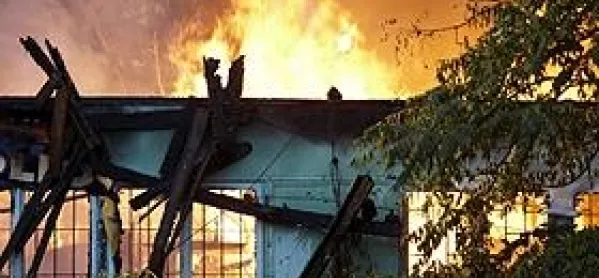From arson to oil spills

Alan Rodgers was “worried instantly” when he received a phone call from his principal teacher at Dumbarton Academy one Sunday, a few months into his probation.
He was right to be. There had been a fire at the school and the PT’s classroom had been gutted. But his room, which was directly below, had been damaged by the water used by firefighters to douse the flames.
“She had been building up work for the past 10 years and it had all been destroyed in a matter of hours,” says Mr Rodgers.
Three pupils had started the fire by throwing lit paper-towels in through an open window.
Both classrooms were out of action for weeks. It was an emotional time, he admits, but the authority’s use of restorative practices helped all those affected to move on.
“The boys had to face up to their actions and admit what they had done to their teachers and parents.”
stephanie cook had received one lecture lasting an hour on traveller children during her PGDE teacher-training year.
“I took notes and filed them away, thinking, `I don’t know if I’ll need these’,” she admits.
Ms Cook was to serve her probation at Kinellar School in Aberdeenshire, the catchment for a permanent traveller site. At the start of term, she had no traveller children in her P5 class, but after the October break a new pupil arrived. “M” was illiterate. She could not recognise her name, or even its first letter. “She could not describe what she was wearing, what she had had for lunch, what she liked to eat, what she liked to do.”
When Ms Cook’s back was turned she pulled her classmates’ hair and drew on their faces. They, in turn, excluded her. “I told them they were making her feel uncomfortable.”
Gradually, things improved. Ms Cook ate with M, teaching her to use a knife and fork, and she read up on the early level of Curriculum for Excellence. “I created a programme of work for her with a timetable focusing mainly on literacy and counting to 10.”
The other children helped M with her reading and the family asked for work to be sent home. “I realised inclusion was about every person in the class feeling part of something; they didn’t have to do everything together all the time.”
“They were chewing gum, drawing graffiti on books and making a mockery of me. It was like something out of Grange Hill,” says Michelle Sterricks.
She expected to be teaching S1-4 pupils in her probation year at Galashiels Academy in the Borders. Demand for Higher history had soared, however, and she was asked to take an S5 class.
“I had mixed emotions. On the plus side, it meant I was being trusted to teach Higher in my first year of teaching; on the negative side, it was a huge responsibility.”
Ms Sterricks gained the nickname “exterminator” in her other classes, but struggled with behaviour management in her Higher class.
Things hit an all-time low when she had to use her classroom alarm to summon the senior management team, because she felt physically threatened by two pupils. The behaviour management system was used to remove the two boys and Ms Sterricks was paired with a senior teacher. She observed her classes and watched how other teachers dealt with the same pupils.
“I won this class over and gained respect for it. One parent said to me, `you’re the reason my son gets out of bed in the morning’. I’m proud of the class and of myself for persevering.”
Alice Scrimgeour created her own critical incident by deliberately destroying her P5 pupils’ work at East Linton Primary, East Lothian.
The children were working on a biodiversity topic. They researched different habitats: Antarctic, rainforest, ocean and savannah. “They produced some of the most intricate wall displays I’ve seen completed by children of this age-group,” she boasts.
And then, when they went out for lunch, she destroyed them. Sea levels had risen in the Antarctic, the rainforest had been bulldozed, there had been an oil spill in the ocean and a drought in the savannah.
The pupils were outraged. But Ms Scrimgeour used their anger to persuade them to take action. “I asked them what they were going to do. Previously, we had talked about campaigns and their purpose and discussed WWF and Greenpeace.”
They wrote letters and raised more than pound;650 for WWF, enough to allow each pupil to adopt an animal.
- Original headline: Probationers - From arson to oil spills: the incidents that got new recruits hot and bothered
Keep reading for just £1 per month
You've reached your limit of free articles this month. Subscribe for £1 per month for three months and get:
- Unlimited access to all Tes magazine content
- Exclusive subscriber-only stories
- Award-winning email newsletters



